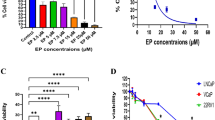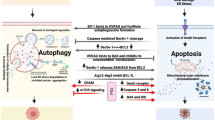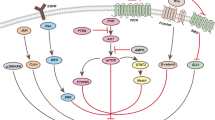Abstract
Docetaxel was the first chemotherapeutic agent to increase survival time in patients with androgen-resistant prostate cancer. However, it provides only a modest increase in survival and is associated with significant toxicity. Therefore, there is an urgent need to identify potential adjunct therapies. Given the key role of autophagy in both tumour survival and chemoresistance, the impact of autophagy modulation on docetaxel toxicity was tested in vitro. PC-3 and LNCaP cells were pre-treated with the autophagy inhibitor 3-methyladenine (5 mM) and then exposed to various concentrations (0–100 μM) of docetaxel. Cytoxic effects of docetaxel were measured using resazurin reduction to resorufin, whilst autophagy and apoptosis was measured using monodansylcadaverine, annexin V and caspase-3, respectively. Docetaxel produced significant toxicity in PC-3 cells but was not toxic to LNCaP cells. Pre-treatment with the autophagy inhibitor, 3-methyladenine (5 mM) significantly protected PC-3 cells against docetaxel-induced cytotoxicity, increased autophagosome formation and apoptosis measured using monodansylcadaverine, annexin V and caspase-3 fluorescence, respectively. In contrast, 3-methyladenine was toxic by itself in LNCaP cells and also increased autophagic vesicle formation and apoptosis but did not influence docetaxel toxicity in these cells. These paradoxical effects of 3-methyladenine were largely independent of reactive oxygen species production. We show here that modulation of autophagy may influence docetaxel-induced toxicity in prostate cancer cells and these effects may differ between cell lines.





Similar content being viewed by others
References
Berthold DR, Pond GR et al (2008) Treatment of hormone-refractory prostate cancer with docetaxel or mitoxantrone: relationships between prostate-specific antigen, pain, and quality of life response and survival in the TAX-327 study. Clin Cancer Res 14(9):2763–2767
Cao C, Subhawong T et al (2006) Inhibition of mammalian target of rapamycin or apoptotic pathway induces autophagy and radiosensitizes PTEN null prostate cancer cells. Cancer Res 66(20):10040–10047
Choi AMK, Ryter SW et al (2013) Autophagy in human health and disease. N Engl J Med 368(7):651–662
Degenhardt K, Mathew R et al (2006) Autophagy promotes tumor cell survival and restricts necrosis, inflammation, and tumorigenesis. Cancer Cell 10(1):51–64
Domingo-Domenech J, Vidal SJ et al (2012) Suppression of acquired docetaxel resistance in prostate cancer through depletion of notch-and hedgehog-dependent tumor-initiating cells. Cancer Cell 22(3):373–388
Gan L, Wang J et al (2011) Resistance to docetaxel-induced apoptosis in prostate cancer cells by p38/p53/p21 signaling. Prostate 71(11):1158–1166
Giampietri C, Petrungaro S et al (2012) Autophagy modulators sensitize prostate epithelial cancer cell lines to TNF-alpha-dependent apoptosis. Apoptosis 17(11):1210–1222
Gozuacik D, Kimchi A (2004) Autophagy as a cell death and tumor suppressor mechanism. Oncogene 23(16):2891–2906
Heidenreich A, Bastian PJ et al (2014) EAU guidelines on prostate cancer. Part II: treatment of advanced, relapsing, and castration-resistant prostate cancer. Eur Urol 65(2):467–479
Herbst RS, Khuri FR (2003) Mode of action of docetaxel—a basis for combination with novel anticancer agents. Cancer Treat Rev 29(5):407–415
Hou H, Zhang Y et al (2012) Inhibitors of phosphatidylinositol 3′-kinases promote mitotic cell death in HeLa cells. PLoS One 7(4):e35665
International Agency for Research on Cancer (2012) Prostate cancer: estimated incidence, mortality and prevalence worldwide in 2012. Retrieved 29/10/14, 2014, from http://globocan.iarc.fr/Pages/fact_sheets_cancer.aspx
Kanzawa T, Zhang L et al (2005) Arsenic trioxide induces autophagic cell death in malignant glioma cells by upregulation of mitochondrial cell death protein BNIP3. Oncogene 24(6):980–991
Koren I, Kimchi A (2012) Promoting tumorigenesis by suppressing autophagy. Science 338(6109):889–890
Marino G, Niso-Santano M et al (2014) Self-consumption: the interplay of autophagy and apoptosis. Nat Rev Mol Cell Biol 15(2):81–94
McFarland AJ, Anoopkumar-Dukie S et al (2012) Inhibition of autophagy by 3-methyladenine protects 1321N1 astrocytoma cells against pyocyanin- and 1-hydroxyphenazine-induced toxicity. Arch Toxicol 86(2):275–284
McFarland AJ, Grant GD et al (2013) Paradoxical role of 3-methyladenine in pyocyanin-induced toxicity in 1321N1 astrocytoma and SH-SY5Y neuroblastoma cells. Int J Toxicol 32(3):209–218
O’Neill A, Prencipe M et al (2011) Characterisation and manipulation of docetaxel resistant prostate cancer cell lines. Mol Cancer 10(1):126
Petrylak DP, Tangen CM et al (2004) Docetaxel and estramustine compared with mitoxantrone and prednisone for advanced refractory prostate cancer. N Engl J Med 351(15):1513–1520
Selvakumaran M, Amaravadi RK et al (2013) Autophagy inhibition sensitizes colon cancer cells to antiangiogenic and cytotoxic therapy. Clin Cancer Res 19(11):2995–3007
Tannock IF, de Wit R et al (2004) Docetaxel plus prednisone or mitoxantrone plus prednisone for advanced prostate cancer. N Engl J Med 351(15):1502–1512
Vacca A, Ribatti D et al (2002) Docetaxel versus paclitaxel for antiangiogenesis. J Hematother Stem Cell Res 11(1):103–118
Wu YT, Tan HL et al (2010a) Dual role of 3-methyladenine in modulation of autophagy via different temporal patterns of inhibition on class I and III phosphoinositide 3-kinase. J Biol Chem 285(14):10850–10861
Wu Z, Chang PC et al (2010b) Autophagy blockade sensitizes prostate cancer cells towards Src family kinase inhibitors. Genes Cancer 1(1):40–49
Acknowledgments
This work was funded by the Griffith Health Institute, Griffith University.
Conflict of interest
The authors declare that they have no conflict of interest.
Author information
Authors and Affiliations
Corresponding author
Additional information
Rebecca D. Pickard, Briohny H. Spencer and Amelia J. McFarland contributed equally to this work.
Rights and permissions
About this article
Cite this article
Pickard, R.D., Spencer, B.H., McFarland, A.J. et al. Paradoxical effects of the autophagy inhibitor 3-methyladenine on docetaxel-induced toxicity in PC-3 and LNCaP prostate cancer cells. Naunyn-Schmiedeberg's Arch Pharmacol 388, 793–799 (2015). https://doi.org/10.1007/s00210-015-1104-7
Received:
Accepted:
Published:
Issue Date:
DOI: https://doi.org/10.1007/s00210-015-1104-7




